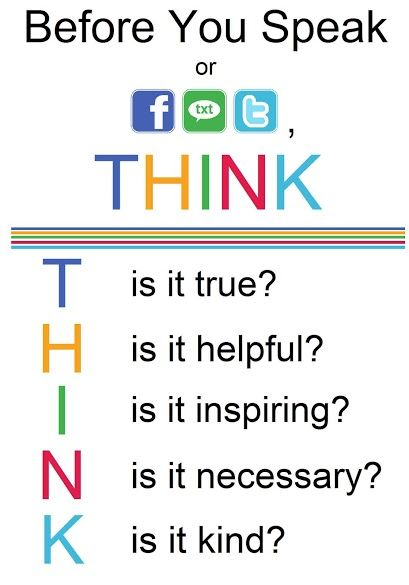
Last Wednesday, June 11, Educational Technology published a brief article titled "15 Essential Netiquette Guidelines to Share with Your Students." It caught our eye right away as it featured a graphic that is similar to one of our most popular poster templates. It also included a thorough infographic from Touro College's Online Education Department. This sort of in-depth infographic would be great to send to your students before launching any sort of online-based learning community such as a message board or online forum.
We also see the value in displaying a large poster like this VariQuest template reminding students of basic etiquette before texting, posting, tweeting, etc. THINK: Is it true? Is it helpful? Is it inspiring? Is it necessary? Is it kind?
Interested in a poster like this for your classroom? Click below to request a free poster sample printed by the Perfecta 2400. You will be able to specify that you would like to request the THINK poster. Click below!
Here is a quick round-up of these 15 netiquette rules written by Educational Technology (click here for the full article and infographic):
- Before posting your question to a discussion board, check if anyone has asked it already and received a reply.
- Stay on topic. Don't post irrelevant links, comments, thoughts or pictures.
- Don't type in ALL CAPS! If you do it will look like you are screaming.
- Don't write anything that sounds angry or sarcastic even as a joke, because without hearing your tone of voice, your peers might not realize you're joking.
- Always remember to say"please" and "thank you" when soliciting help from your classmates.
- Respect the opinion of your classmates. If you feel the need to disagree, do so respectfully and acknowledge the valid points in your classmate's argument. If you reply to a question from a classmate, make sure your answer is accurate!
- If you ask questions , many people respond. Summarize all answers and post that summary to benefit your whole class.
- Be brief. If you write a long dissertation in response to a simple question, it's unlikely that anyone will spend the time to read through it all.
- Don't badmouth others or call them stupid. You may disagree with their ideas but don't mock the person.
- If you refer to something your classmate said earlier in the discussion, quote just a few key lines from their post so that others won't have to go back and figure out which post you're referring to.
- Before asking a question, check the class FAQs or search the Internet to see if the answer is obvious or easy to find.
- Check the most recent comments before you reply to an older comment.
- Be forgiving. If your classmate makes a mistake, don't badger him or her for it. Just let it go.
- Run a spelling and grammar check before posting anything to the discussion board.








![[Lesson Plan Activity] ELL Bingo](https://content.cdntwrk.com/mediaproxy?url=https%3A%2F%2Finfo.variquest.com%2Fhubfs%2F3D%2FLesson_Plan_Pics%2Fell%2520bingo%2520header.png&size=1&version=1753195128&sig=ebc051ac021c1960f75e8f80a97d9355&default=)
![[Lesson Plan] First Day of School Feelings](https://content.cdntwrk.com/mediaproxy?url=https%3A%2F%2Finfo.variquest.com%2Fhubfs%2Fimages%2FProducts%2FCutout_Maker%2Fthe%2520start%2520of%2520a%2520new%2520school%2520year%2520cutout%2520maker.jpg&size=1&version=1752780346&sig=847b11606c169458fea71bb69e2360e0&default=)
![[Lesson Plan Activity] Kindness Calendar](https://content.cdntwrk.com/mediaproxy?url=https%3A%2F%2Finfo.variquest.com%2Fhubfs%2F3D%2FLesson_Plan_Pics%2Fkindness%2520calendar%2520header.png&size=1&version=1752703157&sig=3fa07390d2b175137c148d7763d6a980&default=)





![[Lesson Plan] Celebrate the Chinese New Year 2025!](https://content.cdntwrk.com/mediaproxy?url=https%3A%2F%2Finfo.variquest.com%2Fhubfs%2FCarman%2FCNY%25201-2018%2F%25E6%2581%25AD%25E5%2596%259C%25E7%2599%25BC%25E8%25B2%25A1.png&size=1&version=1737070708&sig=d89d716a42e2737ee7122119d2052225&default=)


![[Lesson Plan] Election Activities for Grades 2-6](https://content.cdntwrk.com/mediaproxy?url=https%3A%2F%2Finfo.variquest.com%2Fhubfs%2FLesson_Plan_PDFs%2Felections%2520lesson%2520plan%2520header%2520blog.png&size=1&version=1730049507&sig=c8f9bdb2545ac4d7408ee3c224f15b3d&default=)





![[Lesson Plan] Arbor Day Activities for Grades 4-6](https://content.cdntwrk.com/mediaproxy?url=https%3A%2F%2Finfo.variquest.com%2Fhubfs%2FLesson_Plan_PDFs%2Farbor%2520day%2520activities%2520blog%2520header.png%23keepProtocol&size=1&version=1713281322&sig=fa93c6558caab80b84ee1b7a3f74e75c&default=)